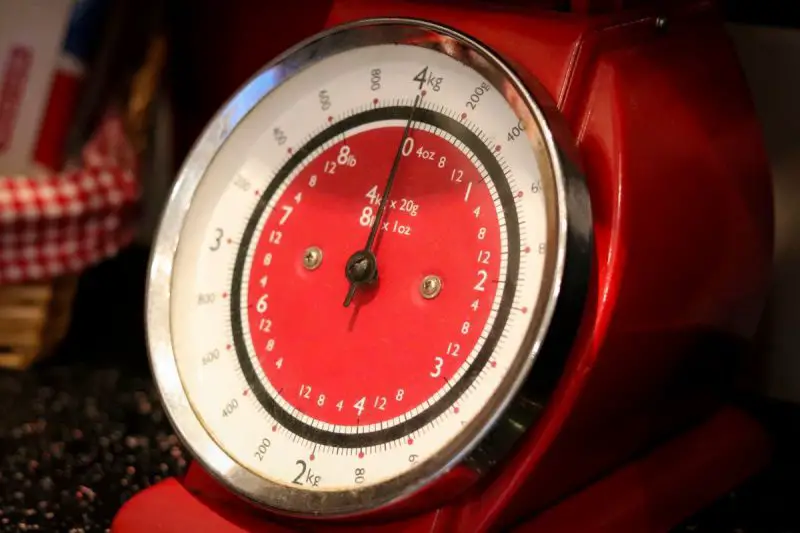Have you found yourself wondering how many grams are in a kilogram? Maybe you need to convert grams to kilograms and don’t know where to start?
Or are you curious and want to know more? Whatever your question is, we have the answer for you!
Converting can be tricky work, no matter the measurement you are working with.
You can quickly find yourself overwhelmed and confused, unsure how to do the conversion and work out how many grams or kilograms you need.
And if you are standing in your kitchen trying to cook a meal, you don’t need this added stress!
But what can you do? No matter how much you search or the math you do in your head, you just can’t seem to get the answers that you need.
Well, no more! Today we are here with the answers that you need. Keep reading to find out how many grams are in a kilogram and how you can convert grams to kilograms today.
Never again will a conversion slow you down!
What Is A Kilogram?
Before we dive into today’s article, let’s have a quick recap for those that need it! A kilogram is a unit of measurement that is typically used in food and weight lifting.
The kilogram was introduced originally as a unit to determine mass as part of the metric system.
Despite the metric system not being used unilaterally across the globe, you can expect to see kilograms across the world!
You can expect to find it on large packets of food like pasta or rice, that’s right, we mean those huge sacks of pasta or rice you can get at the store!
You also typically see them in gyms, especially on free weights and weight plates used on bars. You might also be weighed in kilograms, with your weight displayed as 70kg for example.
Kilograms are used as a measurement of mass in a similar way that we use pounds and stones (lbs and st).
Typically this measurement is used in the UK, as their imperial weight is used for food and body weight, but you might see pounds also used on food and in the gym in the US.
Generally, though you will see kilogram, or kg, on your food and gym equipment. You might also see grams, displayed as 300g, for example.
Grams are used as a smaller measurement than kilograms, but don’t worry, we will cover this now!
How Many Grams In A Kilogram?
So how many grams are in a kilogram? Well, there are 1,000 grams in 1 kilogram.
Typically, grams are used up until 900g, with heavier items being listed in kilograms. So you would see 1.6kg rather than 1,600 grams.
Not only is it easier for manufacturers to print, but it allows you to see quickly what the weight is before picking the item up!
You don’t want to spend ages working out how heavy a weight is before you lift it, do you? You want to see that it’s 25kg and grab it, rather than trying to calculate what 25,000g is!
Kilogram, as we have said, is typically used for heavier weights, but you will also find it in lieu of grams on smaller weights too.
How you see the weight listed on an item will be down to the manufacturer’s preference, so it’s worth knowing the difference so you can spot them easily!
You might see 0.1kg listed on a packet or item, this converts to 100g, and anything that is 0.0Xkg will be less than 100g, for example 0.08kg is 80g.
Being able to tell the difference between kilograms and grams will save you so much time in the gym, store, and when you are cooking!
So be sure to read packages carefully to identify if the weight is written in grams or kilograms.
The same applies to when you are reading cooking instructions in a recipe.
Generally, you will find that grams are used more than kilograms, but if you are making a large portion, then the recipe might use kg without you realizing it has switched!
Pay close attention to the units used to ensure that you always use the correct quantities.
Now that we know there are 1000g in 1 kilogram, let’s move on to see how we can convert grams to kilograms and everything else you need to know!

How To Convert Grams To Kilograms
Converting grams to kilograms and vice versa is fairly straightforward!
As we know, there are 1000g in 1 kilogram, so to convert your gram mass into kilograms, you will simply divide it by 1000.
Say you have 1000g. Dividing 1000 by 1000, gives you a total of 1, meaning 1000g is 1kg.
The same goes for larger numbers, so 10,000g divided by 1000 would be 10, giving us a final answer of 10kg.
This calculation is simple enough with large easy numbers like 1000 and 10,000, but when you have tricky numbers like 75,435g you might want to use a calculator (the answer is 75,435kg)!
Another way to think about how we convert grams to kilograms is to move the decimal point three spaces.
If we think of our initial 1000g, there is a decimal point after the final zero, so it would look like 1000.
We can take the decimal point when we are dividing and move it forward three spaces, so the decimal point now sits between the one and the first zero, like this 1.000.
As we now don’t need to list the three zeros sitting beyond the decimal point, we can list this as 1kg.
Of course, if the numbers below the decimal point were higher than zero, then we would list them as we did earlier when we looked at examples like 1.6kg.
To calculate how to convert kilograms into grams, we will do the opposite and multiply our kilogram number by 1000 to see the value of the mass in grams.
For example, 1kg multiplied by 1000 would give us 1000g. If we were dealing with a number that included a value beyond the decimal point like 1.6kg, we would multiply it by 1000 to give us an answer of 1600g.
This time, instead of moving the decimal point, we are going to keep it where it is and move the number.
You can do the same approach with the division if you wish to. So keep the decimal point where it is, between the one and the six.
As we multiply by 1000, we are going to move each number forward three spaces, adding in zeros to fill any spaces we don’t have a number for.
So, by moving the one forward three spaces, it now represents 1000, and when we move the six forward three spaces, it represents 600.
Adding the two together, we get 1,600 with a decimal point sitting after the last zero.
Again, we can work it out with simple numbers in our head quite easily, but when they become more complex, or we have a lot going on around the decimal point it can get tricky.
Don’t be afraid to whip out your calculator to work it out, at least that way you know your calculations are correct!
How Many Grams In A Pound?
Earlier, we mentioned that the UK and those following the imperial system used pounds and stones when stating the mass of an item.
You will likely come across this measurement at some point and might want to convert it to grams so you can better understand the weight of the item.
One pound has 453.592 grams in it.
Often we disregard the third number beyond the decimal point unless we are using it to round up the second number (only when the third is 5 or greater), so you might see it converted as 453.59g for every pound.
There are fourteen pounds in a stone, giving one stone a value of 6350.29g.
To work out how many grams are in a pound, you would multiply the number by 453.6 (here we have rounded up the .59), or to work it out in stones, you would multiply the value by 6350.3 (again rounding up the .29).
Doing so will tell you how many grams are in the pound and allow you to calculate the quantity you need or the weight of the item.
This isn’t math most of us can do in our heads, but thanks to the inventions of calculators and mass converters online, we don’t need to! Simply input the information and you will get your answer.
Read More: How Many Ounces Are In a Half-Gallon of Water?
Final Thoughts
And there you have it, there are 1000g in one kilogram. You can convert grams to kilograms easily by dividing by 1000 and multiplying your kilogram weight by 1000 to work out its weight in grams.
Whether you are using the information for cooking purposes, weightlifting in the gym, or calculating how heavy an item will be, we hope you have seen how easy these conversions can be!
- What Size is Regular Printer Paper? Quick Guide for Paper Dimensions - June 18, 2023
- What Size is My Monitor: A Comprehensive Guide - June 18, 2023
- How Big is Italy Compared to the US? A Concise Comparison - June 16, 2023

